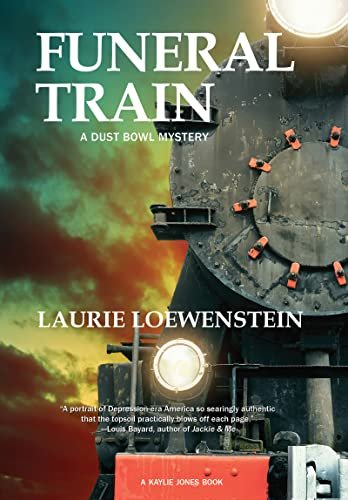Funeral Train by Laurie Loewenstein
/Funeral Train
By Laurie Loewenstein
Akashic Books 2022
Laurie Loewenstein follows up her first Dust Bowl murder mystery, 2018’s Death of a Rainmaker, with Funeral Train, a new adventure of Sheriff Temple Jennings of 1930s Vermillion, Oklahoma. In this new book (a pretty trade paperback with deckled edges and French flaps), Sheriff Jennings is impatient for the return of his feisty, straight-talking wife Etha, who’s been away in St. Louis visiting a friend and is due back on the evening train. Temple at first thought he’d enjoy her absence, a brief return to carefree days of bachelorhood, but it’s been a few days, and he’s chafing at his loneliness, puttering around his little town, contemplating what kind of gift to get for Etha. He resists the idea of fancy-looking fur trims for his wife’s winter coat, thinking it might send the wrong message for a public servant in a small town desperately struggling in the depth of the Great Depression, and a friendly shop owner tries to reassure him:
So how does this work? We all play a little game. The housewives, they make meatloaf as always but add more bread than meat. They cut up and sew together feed sacks to dress the family. The farmer uses the labor of his wife and his children, even the youngest, where once a hand would be hired. Everyone knows that the meatloaf is not the same, the dresses are made from sacking, the scany crop has been harvested by children, but no one says it out loud. We all pretend that things are as they were before. We all pretend that our lives will eventually return to what they were.
Granted, the shop owner is trying to make a sale, but even so there’s a telling truth to such a portrait of the times, and readers of Funeral Train will be grimly pleased when elements of this justification return later in the narrative, warped but every bit as powerful. In the moment, Temple agrees to the sale – and hardly any time later, disaster strikes: the Atchinson, Topeka and Santa Fe Railway train derails near Vermillion in a deafening, ghastly crash that leaves many people dead and many others, including Etha, injured.
Official response is prompt, and soon Temple finds himself working with railroad detective Claude Steele (described rather unenthusiastically as a “good enough investigator but sort of an odd duck”) to figure out what happened.
Loewenstein fills her narrative with such rich atmospheric detail and unobtrusive insights into her Dust Bowl era. When pity is called “that most Midwestern of traits,” you know that it, too, will warp its way back around as the darkness and sadness of the plot accumulates to their peaks, and throughout the book, such dark currents are expertly balanced with the lighter and more uplifting chemistry between Temple and Etha, one of the most natural-seeming and smile-inducing couples currently sleuthing in the mystery genre. It’s true that no railway mystery can be free of century-old familiar lines like “Who else knew about the change in schedule?” – but the, no pun intended, mechanical aspects of the plot are more than compensated for by the strange developing chemistry between Temple and Claude Steele.
Death of a Rainmaker received a satisfying amount of notice and praise for the first book in a series. Funeral Train resoundingly demonstrates that the first book was no fluke. Here’s to a third.
Steve Donoghue is a founding editor of Open Letters Monthly. His book criticism has appeared in The Washington Post, The American Conservative, The Spectator, The Wall Street Journal, The National, and the Daily Star. He writes regularly for The Boston Globe, the Vineyard Gazette, and the Christian Science Monitor.
